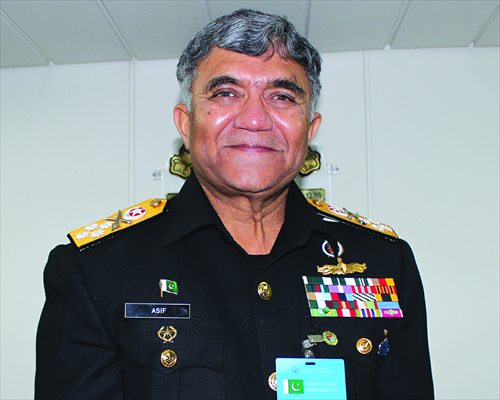Maritime cooperation calls for stronger navy

Admiral Asif Sandila Photo: Yu Jincui/GT
Editor's Note:
Pakistan has just been accepted as an observer state of the West Pacific Navy Symposium (WPNS) at the recent biennial conference in Qingdao. The country has also joined a multinational maritime exercise held by China to celebrate the 65th anniversary of the founding of the PLA navy. Why did Pakistan participate in these activities? How can China and Pakistan deepen maritime cooperation? Global Times (GT) reporter Yu Jincui interviewed Admiral Asif Sandila (Sandila), chief of staff in the Pakistan Navy, about these issues in Qingdao.
GT: Why did Pakistan apply for observer status at the WPNS? Since it has been accepted as the fourth observer state, what's the significance for Pakistan?
Sandila: I must thank the government of China for helping Pakistan become an observer state. The basic purpose of the WPNS is to cooperate and work together, as was done after the unfortunate Malaysian airline accident. Everybody is working together to locate it in the Indian Ocean.
And in the unfortunate ferry incident which took place in South Korea, everybody is also working together. The symposium is basically to help enhance cooperation in fields such as search and rescue, anti-piracy and anti-terrorism. Pakistan is very pleased to get this observer status and we hope we can work with other countries.
GT: What are major challenges Pakistan faces on the sea? How can China and Pakistan deepen navy cooperation to address these challenges?
Sandila: The major challenge we are facing is terrorism. We don't have very peaceful states close to our borders. We need to work with the international community to fight extremism.
Such people generating extremism have no boundaries, they can be anywhere at any time. These people in fact don't fight for religion, but they fight for extremism.
In our region, all the countries, including Pakistan, Afghanistan and the gulf states, should work together to fight these people.
The relations between China and Pakistan are very very strong and friendly, we work and cooperate with each other at all international levels, and so is the relationship between the Pakistan navy and PLA navy. We mutually participate in exercises held by each other.
Pakistan has a large number of ships, helicopters and many other equipment which we have gotten from China. As a matter of fact I will say the best of our ships are from China.
The Chinese navy is now operating in the Indian Ocean, especially in anti-piracy operations. There are lots of fields for our two navies to work together in the future, and exercise in the waters of both sides. There is also lots of scope for both of us to learn from each other and to be working on common ground to maintain maritime security.
GT: April 23, 2014 is the 65th anniversary of the founding of the PLA navy. How do you view the navy power of China? Some have portrayed the Chinese navy as "aggressive" in recent years, how do you view this?
Sandila: I don't think if a country makes its army, navy or air forces strong they are becoming aggressive.
China is a very powerful and big country, it needs to develop a big armed forces, particularly navy forces. Because navy forces can go thousands of miles away to protect the country's own overseas interests, whether they are in the Indian Ocean, South China Sea, or the Persian Gulf.
For example, there is much oil coming to China from the strait of Hormuz, China must be able to protect it.
In the search for the Malaysia airline MH370, which had 154 Chinese on board, China is operating in the South China Sea, the Indian Ocean and waters close to Australia. If Chinese navy forces were not powerful, they would not be able to go there.
Every country has the right to do what they need to do. If China decides it has to have a good navy, it's China's right.
GT: What role do you think the Chinese navy should play in the world, especially in the Indian Ocean?
Sandila: The Chinese navy in my assessment has a very important role to play all over the world, not only in the South China Sea, or the Pacific and India Ocean. Navies can play all over the world. China is a big power now and China has powerful navy forces.
China is a part of international community, it wants to work for the peace of the world. That's how I look at it.
China wants to cooperate with other countries, like in the Malaysian airline incident, like in the anti-piracy work, China wants to tell the world it's part of the international community and it will work for the peace of the world.
Today the Chinese navy is operating for international causes. And Of course they continue to play a very important role in anti-piracy in the gulf.
China is also helping so many countries in Africa and Asia, I don't know how it can become a threat.
GT: The Indian frigate INS Shivalik also participated in the multilateral maritime exercise in Qingdao this time, how do you view the strength of the Indian navy?
Sandila: The Indian navy is very strong I must say. India is a big nation which has over 1 billion people. It has made a very powerful navy and continues to develop the navy forces. It's for that nation to decide.
On the other hand, Pakistan and India do not have very friendly relations at the moment, which makes people in Pakistan very concerned about the development of the Indian navy.
At the same time, we would like to do what we want to do if there's any threat to us. I don't want to say the threat can only come from one place, they can come from anywhere, but we want to be ready for that.